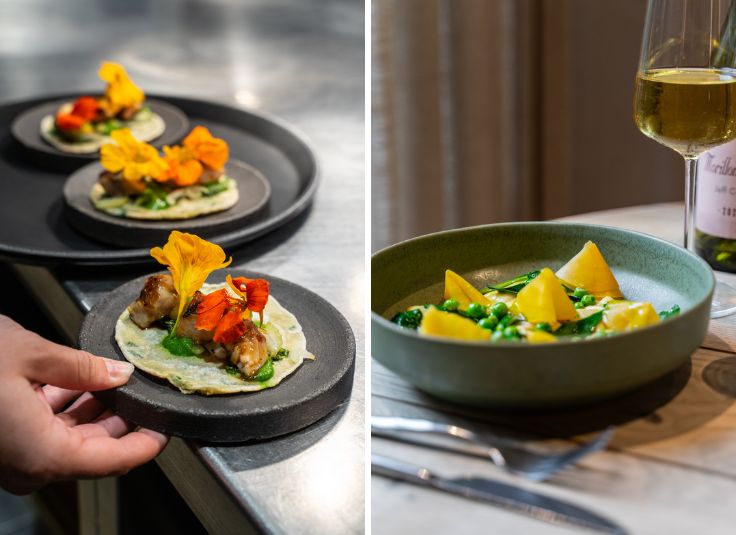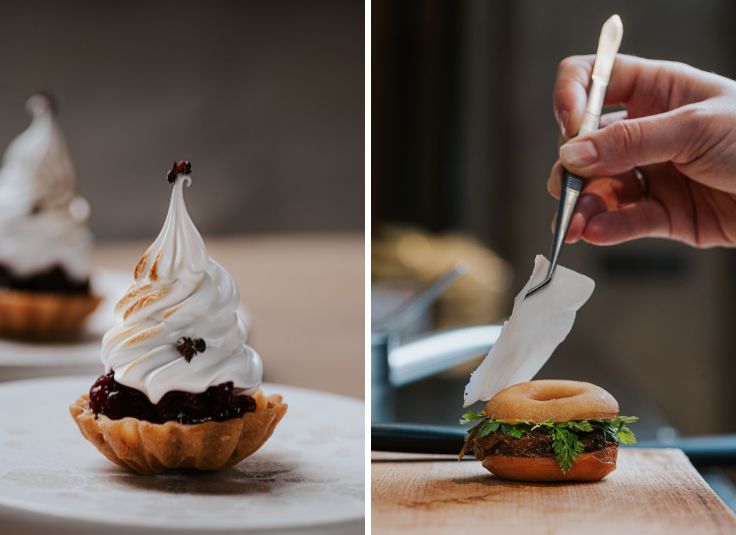It may not seem immediately obvious in the bustling streets of Lithuania's towns and cities, but every Lithuanian has an inherent and long-fostered connection to the country’s lands and waters. For centuries, they have served as comprehensive natural food stores, with root crops coming from the rich earth, fruits and berries from the forests, and fish from the rivers and lakes. Wild game, geese and ducks hang in many a Lithuanian larder, while local honey graces the shelves of pantries, accompanied, of course, by a favourite of the family table, mushrooms, of myriad varieties.
Every season brings its own particular bounty. Spring offers up an abundance of wild greens and fresh herbs – garlic, sorrel, dandelion leaves and nettles – used to flavour hearty soups and salads. While in summer, right across Lithuania, from the rolling hills of Aukštaitija to the forests of Dzūkija, foraging becomes a national obsession. Armed with traditional wicker baskets, Lithuanians forage for wild berries – used to make jams, pies and fruit drinks – as well as all manner of mushrooms, from red pine to honey fungus.
Autumn unlocks its own particular larder of delicacies, a time when root vegetables, nuts, apples, pears and plums are harvested and often preserved to become welcome treats in the harshness of winter. It’s also a time for hearty meals passed down through generations, like cepelinai (stuffed potato dumplings served with sour cream and bacon crackling), kugelis (potato pudding) and substantial stews.

Even the Baltic winter has its place in the seasonal calendar of nature’s offerings. Pickled beetroot forms the basis of thick red soups infused with pieces of pork fat, herbs and vegetables, while homegrown vegetables that were pickled in-season flavour stews and roasts that banish the winter chill. Fish from the lakes and rivers are abundant, and smoked meats and sausages that have been hung for months come into their own.
Another reason why Lithuanians have such an affinity with the earth is their love of gardening. Most rural families still maintain small gardens, which are filled with vegetables, fruits and herbs throughout the year, while in urban areas communal gardens have also emerged as a social hub, where neighbours come together to share tips, seeds and harvests. For many younger Lithuanians, eco-friendly practices are gaining traction as more young gardeners turn to organic methods and heirloom varieties, ensuring sustainability for the future. This love for gardening even extends into schools and nurseries, where children learn about planting and caring for their own green spaces, and fostering a connection with nature from a young age.

Taking this connection between people, food and the land one giant leap further, Red Brick, Lithuania's first Michelin Green Star restaurant, is located on and supplied by its own farm – The Farmers Circle – close to the city of Ukmergė and 80km from the Lithuanian capital.
In 2018, the farm was acquired by Danish entrepreneur and sustainability champion, Niels Peter Pretzmann, who aimed to demonstrate sustainable food production and regenerative farming practices. It now spans over 780 hectares of organic farmland, with 150 hectares retained for wildlife and the preservation and promotion of the natural habitat.
The farm is home to 1,500 free-range hens who produce organic eggs, as well as 470 Black Angus cattle that roam freely and are managed according to sustainable principles focused on promoting natural soil health. Its 15-hectare kitchen garden, meanwhile, produces a variety of vegetables, herbs and berries using natural fertilisers and no-till farming methods. Additionally, its grounds take in a natural spring, from which the restaurant sources its table water.

The farm also includes a food laboratory, where products for all three restaurants in the Red Brick group – including the Michelin Bib Gourmand awarded 14Horses and Michelin Starred Nineteen18 – along with the group's retail outlets, are tested, refined and packaged.
Another innovation in the circle of sustainability is the ergonomically-designed on-farm butchery, created to promote a reduced-stress slaughter process, and also to ensure that no part of the animal ever goes to waste.
The Red Brick restaurant serves as the hospitality centrepiece of the estate and is crafted from the old manor's existing barn, even paying homage to the barn's original wooden roof timbers. Every process in the restaurant’s design and construction was conducted with an eye fixed on sustainable practices.
For those who want to further enhance the experience of dining at Red Brick, their ‘Sleepy Horse’ guesthouse – mere metres from the restaurant and situated in an old stable block – features 15 rooms renovated in the style of traditional wooden stable boxes, where guests can enjoy the rolling landscapes of the Ukmergė region.
Nearby, the old ‘Black Barn’ hosts large cultural events that ensure the creation of a closely-knit rural community spirit, while the ‘Stone Mill’ produces various plant-based products, including pickles and condiments.

The Farm and its other outlets, like Senatorių Pasažas in the heart of Vilnius, adhere to a strategic vision called the ‘Food Triangle’, focusing on sustainability, supporting local culture and sourcing Baltic produce when available.
The ethos of both Red Brick and the entire farm-to-plate movement hinges on this respect for produce and the reduction of unnecessary waste and environment-damaging logistics. So close are the farm's resources to the restaurant, in fact, that chefs can often be seen popping out mid-preparation to pick fresh produce from the nearby kitchen garden – and, according to them, it is all of these small steps that go towards a more circular and sustainable process.
It is this ethos and its supporting practices that stand as the foundation for the restaurant being awarded a Michelin Green Star for its mindful gastronomy, the only such restaurant in Lithuania.

The farm is also the inspiration and resource behind aforementioned restaurants 14Horses and Nineteen18, both of which are housed in the artisanal Senatorių Pasažas mansion in the heart of Vilnius’ Old Town.
Justinas Misius, Head Chef at 14Horses, passionately believes that high quality sustainable food doesn't have to break the bank to be accessible to all. It should offer value for money while using the finest ingredients sourced locally and sustainably – and that's where The Farmers Circle comes in.
When it comes to the meat used in his restaurant, his philosophy is simple. "I see the whole animal and not just a piece of meat. The idea is to adopt a nose-to-tail attitude where nothing is wasted, just like for our grandparents and our great-grandparents. Having access to the farm and its products allows me to do this with every dish we create."
According to Misius, the sustainable practices evident on the farm can also encourage other farmers to grow alternative ingredients and provide an example for the next generation of Baltic food producers.
Misius describes his style of cuisine as being "brutal", not meaning bad, but brutal in terms of a driven, unwavering commitment to providing the very highest quality flavours and ingredients that are sustainable and non-threatening to the environment. He also believes that "it's not only about sustainability, but about making the country a better place, and farmers and food producers can be at the head of a change for the better."

In the industrial but welcoming foyer of Michelin Star Nineteen18, Chef Andrius Kubilius explains the importance of showcasing the possibilities of local ingredients. "Our cuisine is based on what I call survival food – the food and the knowledge that has been passed down through the generations. The food of the people."
He speaks passionately and carefully about the country's history, its past perception of poverty, its occupation, and the role that simple food foraged and grown in nature plays in bringing the past, the present and the future together. But the chef is also proud of the generation who came after the country's freedom from occupation. He acknowledges how they went out to explore the world, bringing home with them new skills, new ideas, new ways of thinking and an understanding of how they could make Lithuania a better place. "They brought with them a new appreciation of how Lithuanian food, farming practices and sustainability could impact the whole future of the country."
Behind the restaurants' success is, of course, The Farmers Circle, along with the belief, by one Danish entrepreneur with a vision, that the way forward is by putting customers first, while simultaneously promoting sustainability, local sourcing and flavour. By doing this, he successfully integrates all three pillars supporting the concept of regenerative farming: environmental stewardship, economic viability and social responsibility.
According to Kubilius, one question overrides all others and it is one that he constantly seeks to answer, "How can we motivate consumers to value food again?"
Lithuania, with its unique combination of a shared remembered history, access to the highest quality foods from farms and from nature, and a generation of enthusiastic and talented people who want to make a difference, is proving that it can, and will, be a force for good in the future of sustainable food production.

Hero Photo: © Red Brick. Article photos courtesy of the The Farmers Circle Group.



















